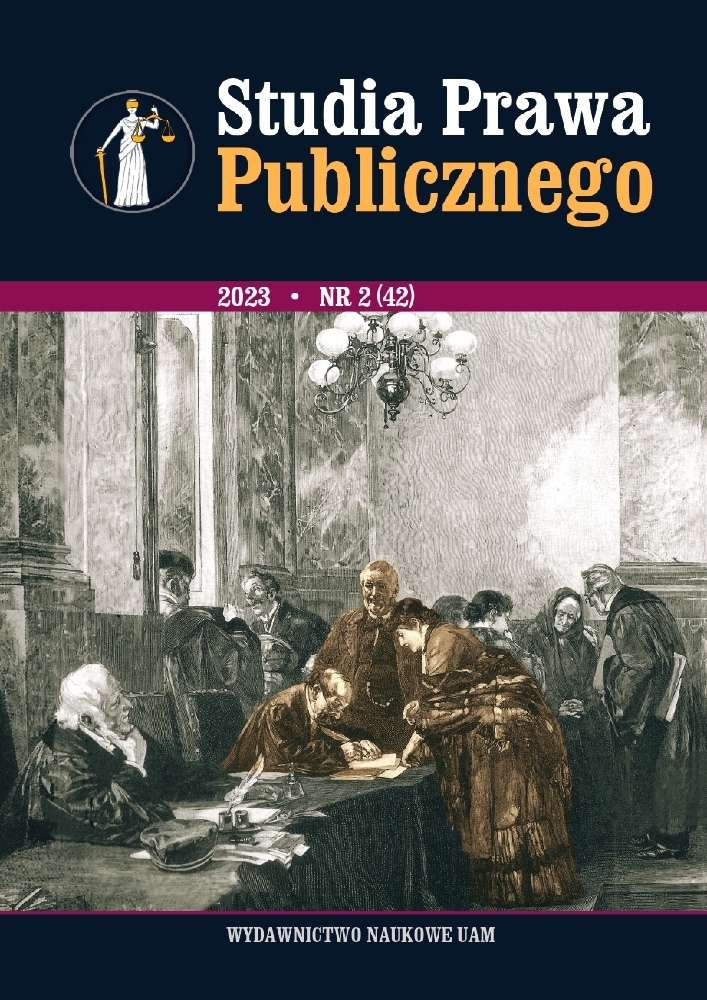Abstract
Nowadays, effective protection of personal data is one of the fundamental issues of a democratic state under the rule of law. Therefore, the legislator should be very precise about the principles and standards of data processing. In the last few decades, in particular, the development of new technologies, digitalisation and the increase in the need for electronic communication has become evident, which leads to the adoption of appropriate regulations for the handling of personal data. In addition, the EU legislator has introduced the General Data Protection Regulation (GDPR) in order to harmonise the regulations of EU Member States regarding the protection of personal data. This provides a framework for the proper functioning of legal provisions across the European Union regarding the handling of personal data of its citizens.
The aim of the article is to identify the legal changes resulting from the Personal Data Protection Regulation, with a particular focus on the persons to which they apply and then to analyse the regulation of ‘the right to be forgotten’. In the first part of the article, attention is drawn to the way personal data are processed and the scope of obligations incumbent on data controllers. This is because data controllers are, together with the personal data protection officer, responsible for recording data processing activities, including ongoing monitoring and responding to situations of inaccurate data processing. The second part focuses on the right to be forgotten and the assessment of this entitlement in the perspective of Regulation 2016/679. The research methods include an analysis of legal acts, at the same time using the subject literature.
References
Banaszak B., Wygoda K., Pojęcie funkcji publicznej jako przesłanka modyfikująca zakres ochrony danych osobowych, w: Biuro Generalnego Inspektora Danych Osobowych, Ochrona danych osobowych wczoraj, dziś, jutro. Personal data protection yesterday, today, tomorrow, Warszawa 2006, s. 59–76.
Czerniawski M., Prawo do bycia zapomnianym w internecie. Glosa do wyroku TS z dnia 13 maja 2014 r. C-131/12, https://sip.lex.pl/komentarze-i-publikacje/glosy/prawo-do-bycia-zapomnianym-w-internecie-glosa-do-wyroku-ts-z-dnia-13-386107074 (dostęp: 2 III 2023). DOI: https://doi.org/10.12775/PBPS.2014.022
Czerniawski M., Sprostowanie i usuwanie danych, w: RODO – ogólne rozporządzenie o ochronie danych. Komentarz, pod red. E. Bielak-Jomaa, D. Lubasza, Warszawa 2018, s. 517–553.
Ganczar M., Informatyzacja administracji publicznej. Nowa jakość usług publicznych dla obywateli i przedsiębiorców, Warszawa 2009.
Gonschior A., Ochrona danych osobowych a prawo do prywatności w Unii Europejskiej, w: Aktualne problemy prawa Unii Europejskiej i prawa międzynarodowego. Aspekty teoretyczne i praktyczne, pod red. D. Kornobis-Romanowskiej, Wrocław 2017, s. 239–288.
Jastrzębska K., Elektroniczna administracja jako narzędzie wdrażania zmian organizacyjnych, Warszawa 2018.
Keller D., The new, worse ‘right to be forgotten’, Politico, 27 I 2016, https://www.politico.eu/article/right-to-be-forgotten-google-defense-data-protection-privacy/(dostęp: 2 III 2023).
Koncewicz T.T., Zasada jurysdykcji powierzonej Trybunału Sprawiedliwości Wspólnot Europejskich. O jurysdykcyjnych granicach i wyborach w dynamicznej „wspólnocie prawa”, Warszawa 2009.
Krasuski A., Dane osobowe w obrocie tradycyjnym i elektronicznym. Praktyczne problemy, Warszawa 2012.
Krasuski A., Ochrona danych osobowych na podstawie RODO, Warszawa 2018.
Krzysztofek M., „Prawo do bycia zapomnianym” i inne aspekty prywatności w epoce Internetu w prawie UE, „Europejski Przegląd Sądowy” 2012, nr 8, s. 29–34.
Lubasz D., RODO. Zmiany w zakresie ochrony danych osobowych. Porównanie przepisów, praktyczne uwagi, Warszawa 2018.
Łuczak J., Prawa osoby, której dane dotyczą, w: RODO – ogólne rozporządzenie o ochronie danych. Komentarz, pod red. E. Bielak-Jomaa, D. Lubasza, Warszawa 2018, s. 464–584.
Pryciak M., Prawo do prywatności, „Studia Erasmiana Wratislaviensia” 2010, nr 4, s. 211–229, https://www.bibliotekacyfrowa.pl/Content/37379/011.pdf (dostęp: 2 III 2023).
Safjan M., Berwid-Wilińska K., Prawo do prywatności osób publicznych, w: Biuro Generalnego Inspektora Danych Osobowych, Ochrona danych osobowych wczoraj, dziś, jutro. Personal data protection yesterday, today, tomorrow, Warszawa 2006, s. 371–397.
Sakowska-Baryła M., Prawo do ochrony danych osobowych, Wrocław 2015.
Sieńczyło-Chlabicz J., Ochrona prywatności i wizerunku osób powszechnie znanych w świetle orzeczenia Europejskiego Trybunału Praw Człowieka – von Hannover v. Niemcy, „Zeszyty Naukowe Uniwersytetu Jagiellońskiego. Prace z Prawa Własności Intelektualnej” 2007, nr 4, s. 399–416, https://sip.lex.pl/komentarze-i-publikacje/artykuly/ochrona-prywatnosci-i-wizerunku-osob-powszechnie-znanych-w-swietle-151083435 (dostęp: 2 III 2023).
Stuart A.H., Google Search Results: Buried If Not Forgotten, „North Carolina Journal of Law and Technology” 2014, nr 15(3), s. 463–517.
The Advisory Council to Google on the Right to be Forgotten, February 2015, https://static.googleusercontent.com/media/archive.google.com/pl//advisorycouncil/advisement/advisory-report.pdf (dostęp: 2 III 2023).
Weber R.H., The Right to Be Forgotten: More Than a Pandora’s Box?, „Journal of Intellectual Property, Information Technology and E-Commerce Law” 2011, nr 2, s. 120–130.
License

This work is licensed under a Creative Commons Attribution-NoDerivatives 4.0 International License.

